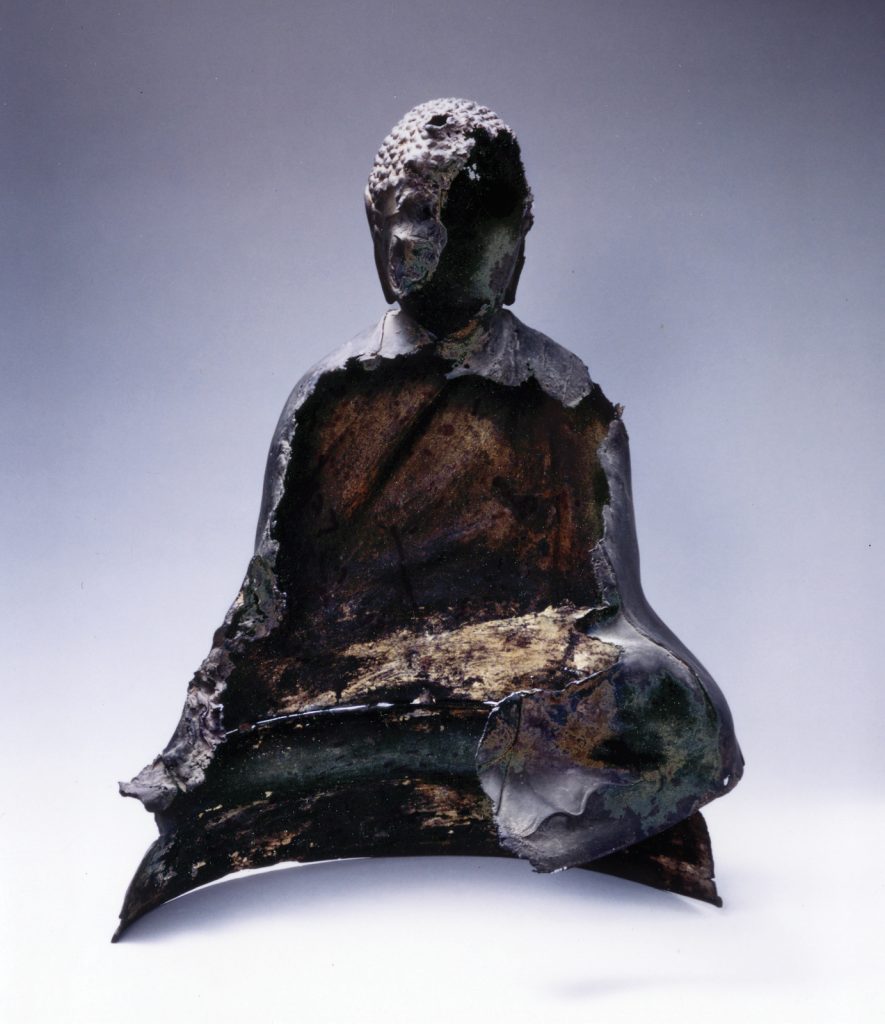One day after a Saturday lecture, my Buddhist teacher Shunryu Suzuki opened the floor to questions. This was in 1968, at the height of the Vietnam War. I was in my early twenties at the time, working as an antiwar activist by day and learning about Buddhist meditation at Suzuki’s temple on weekends. I raised my hand and asked the question that was troubling me and so many of us in the room. “Suzuki Roshi,” I said, “What is war?”
He pointed to the goza mat in front of him, a six-by-three-foot thin rush mat on which two people were seated, and said, “When two people sit down on one mat, each person smooths the wrinkles on his side of the mat. When the wrinkles meet in the middle, that’s war.”
What a strange response, was my first thought. Then I remembered that Suzuki had lived through World War II as a temple priest in Japan. It was never clear why he wasn’t drafted into the Japanese army. Some people said it was because he was too short. Others said it was because temple priests were needed at home. Though he never talked about what he had experienced during the war, we all knew that it had been a traumatic and searing time for him. He once told us, “You Americans have seen the worst of my country. I came here to show you the best.” By that he meant Buddhism and Zen meditation. In any case, Suzuki’s answer to my question had to be taken seriously. He knew far more about war than any of us young Americans did.
At the time, his answer triggered a vigorous discussion in the whole group about the war in Vietnam and the fact that on this same day there was a big antiwar demonstration in the park—many of us had been conflicted about whether to go to the demonstration or come to Suzuki’s temple. Suzuki listened patiently to the back-and-forth of our discussion without saying anything. I’m sure that he appreciated our sincerity, but at the same time, given his own war experience, we probably struck him as young and naive.
His answer taught us that war was not just some vast, abstract governmental action happening out there in the world, against which we had to demonstrate and protest.
I’ve had decades since then to ponder his answer, and on deeper reflection I have realized that the story has many nuances and implications. Clearly the notion that each person wants their side of the mat to be smooth is an observation about a certain aspect of human nature. We tend to take care of our own needs first, or the needs of our family, community, or tribe, before we include the needs of anyone outside those circles. Only an unusually perceptive and aware person would take into account the needs of others when it causes inconvenience or suffering to themselves or their own group. There is a theory of moral stages created by the American psychologist Lawrence Kohlberg that maps a person’s ethical development from infancy through childhood and adulthood. According to this representation, to act from an awareness of “the greatest good for the greatest number,” to quote the famous dictum of philosopher John Locke, demonstrates a high level of moral development. Such principles form the basis of modern liberal democracies, including our own.
The highest moral stage, according to Kohlberg, is “transcendent morality,” in which a person’s awareness of the common good is so broad and evolved that it includes sacrificing one’s own well-being, or even one’s life, in the service of the universal welfare of all beings. This is the moral stance of such heroes as Mahatma Gandhi and Martin Luther King Jr., as well as of Buddhism itself. Suzuki Roshi’s comment about the wrinkles in the mat, I believe, emanated from that kind of Buddhist understanding. Given that understanding, it must have been horrific for Suzuki to watch helplessly as his entire country was swept up in a terrible war which it lost at the cost of more than two million young men. I once saw a photograph of the young Suzuki presiding over a ceremony at his temple to send the temple bell off to a factory to be melted down into bullets. He looked so sad in the photograph. I have often wondered how many funerals of young men Suzuki presided over during those war years. Assuredly, there were many.
In today’s world, one war that we are all facing is an internal war—some say a “cold civil war”—between political factions, red and blue, right and left. His answer might apply to that war too. There are so many ways in which Suzuki Roshi could have responded to my question, so many philosophical or religious doctrines that might have framed and explained the subject of war. But he did not do that. Instead, he just pointed to what was right in front of him: two people sitting on a straw mat. His answer taught us that war was not just some vast, abstract governmental action happening out there in the world, against which we had to demonstrate and protest. The real war starts right here, within each of us, and the first challenge is to face the conflict that lives within our own hearts. He didn’t directly say whether we should have gone to the antiwar demonstration or come to his temple for meditation, but his response to that was implicit in the answer he did give. If you want to truly know what war is, he was saying, sit down on a straw mat with one other person and don’t try to smooth out just your side. Be willing to accept the wrinkles that are always there, for everyone.
♦
This piece appeared in a different form on Good Men Project.
Thank you for subscribing to Tricycle! As a nonprofit, we depend on readers like you to keep Buddhist teachings and practices widely available.
